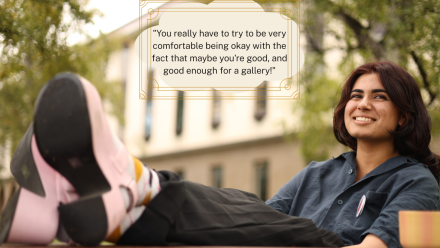Jel Studio is stitching affordability and circularity into second-hand fashion
Considering the large number of textiles dumped in the ocean each year, it almost seems fitting that an aquatic-themed second-hand clothing studio would come to life. But Jel Studio founder, Chunyao (Yao) Zhuang says the connection is completely coincidental.
Zhuang, who is currently in her third year of a Bachelor of Actuarial Studies at The ┬ķČ╣┤½├ĮAV National University (ANU), says she has always loved jellyfish, but it wasnŌĆÖt until this semester that she decided to combine those tentacles with the threads of the fashion world.
With an ethically conscious head on her shoulders and a long-held passion for second-hand clothing, Zhuang was surprised to discover thereŌĆÖs wasnŌĆÖt already a space for slow fashion on the ANU campus.
But she wasnŌĆÖt waiting around for that to change.
ŌĆ£Growing up, I did a lot of art and was also really interested in fashion. I have a lot of friends who are into the same thing. We really love going to thrift shops together and getting clothes second-hand.
ŌĆ£I noticed something like this wasnŌĆÖt on the ANU campus and thought that it might be a good opportunity for people to get rid of their old clothes.ŌĆØ
Jel Studio is hard to miss as you make your way to the heart of Kambri on ANU campus. The Jellyfish sign is the first clue, followed by transparent glass windows that reveal racks of clothes, colours and accessories that, for any passer byer, quickly invite you inside.
While Zhuang's brainchild has only found its sustainable footing for a month or two now, her studio is quickly curating a diverse and carefully considered array of clothingŌĆöfrom wardrobe basics to "tech" pieces and even ogal, a popular Japanese schoolgirl aesthetic.
Zhuang says this is in part due to the volume of donations from students and the clever system she has set up for those who do so.
ŌĆ£We have a reward cost system. So if you donate five clothing items, you get one stamp and then after five stamps, you get five dollars off,ŌĆØ explains Zhuang.
ŌĆ£We want to make shopping here affordable, and I think our prices are already pretty cheap so by getting five dollars off on top of that, thatŌĆÖs a pretty good deal. You can also share the reward system with friends; that way, we can get a lot of a lot more donations, and they can get their discount a lot faster.ŌĆØ
The popularity of thrifting has firmly tangled itself into Gen Z culture, with platforms such as TikTok and ŌĆśthrift hallsŌĆÖ only solidifying its influence. Zhuang says she has noticed price increases in second-hand clothing shops outside of ANU, with branded items particularly inaccessible.
ŌĆ£We try our best to keep prices consistent, because when it comes to thrifting, part of the fun is finding a bargain, right? So, we want to keep that element.
ŌĆ£When I first started and set my prices, my friends told me that they were probably a bit high, and I took that on board and lowered them because I want everyone to be able to shop here.
ŌĆ£Some places outside of ANU also focus a lot on brands, so I wanted to have something on campus that didnŌĆÖt do that.ŌĆØ
While it is no surprise that fast fashion and sustainability are at seemingly opposite ends of the ethical spectrum, Zhuang says unthreading the sloppy stitches of cheaply made clothing played an important role in bringing Jel Studio to life.
ŌĆ£I dug a lot deeper into how fast fashion actually works, the amount of money it pays workers, and how that affects the environment. We made sure to consider all of those elements.ŌĆØ
With this in mind, Zhuang has not only created a slow and sustainable collection of clothing but also a circular one; repairing and reusing unwearable clothing and, in doing so, giving them new life.
"I really enjoy doing textiles myself. Right now, we don't have that many remakes because the semester is back, but we have made men's trousers from a long skirt; they are hanging somewhere in the store. We also turned a sweater that had shrunk into a bag.
ŌĆ£I think that makes clothes a bit more interesting and more fun to style because you have something that no one else does,ŌĆØ says Zhuang.
While Jel studio (at this stage) will be open for three months, Zhuang is eager to extend her studio beyond this timeframe. To do so, she says that support and donations from the ANU community will play an important role in slowing fashion down both on and off campus ŌĆō without our pockets having to feel the sting in the process.
ŌĆ£Jel Studio is cheap, affordable and sustainable. Even if you donŌĆÖt want to buy clothes, you are able to donate; we always welcome that - please donate! That really does help us,ŌĆØ says Zhuang.
ŌĆ£We would love to keep Jel studio open for longer than that so we can keep selling and remaking clothes.ŌĆØ


